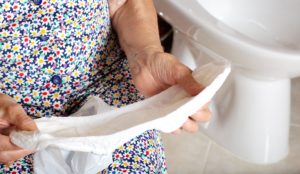
Dementia is a degenerative disease, and although it commonly affects the mind, it can affect other areas of health too. Case-in-point, some dementia patients may experience bladder leaks before they notice cognitive changes.
It has been reported that a person with Alzheimer’s disease may have a higher risk of incontinence and other bathroom-related issues than someone without. Reasons for this include:
- Lacking the ability to react quickly to the sensation of needing to urinate
- Failing to get to the toilet in time as a result of mobility issues
- Difficulty communicating to others that they need to use the toilet
- Not being able to recognize or locate a bathroom and urinating in inappropriate locations
- Not understanding someone who is directing them to a toilet
- Being forgetful of how to perform the action
- Not being willing to accept help from others to use a toilet, possibly due to embarrassment
- Not attempting to use the bathroom due to possible depression, distraction, or lack of motivation
The Alzheimer’s Society has explained, “For some people, incontinence develops because messages between the brain and the bladder or bowel don’t work properly. This may mean people don’t recognize that they have a full bladder or bowel, or have the control needed to empty them. However, this is not a common cause of toilet problems and incontinence in people with dementia. It usually only occurs when the person’s dementia is more advanced.”
If you recognize that someone you know has been experiencing more frequent bladder leaks, encourage them to see a doctor, as it could be an early sign of dementia.
Also read:
- Natural bladder supplements: 18 herbal remedies for overactive bladder
- 9 Yoga poses to strengthen your bladder
- 8 reasons for your leaky bladder